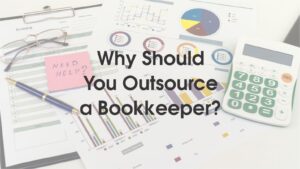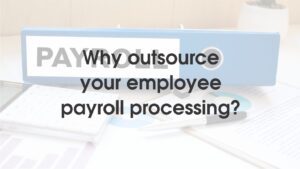Choosing the Right Bookkeeping Services for Your Small Business
Entrepreneurs who are focused on the day-to-day operations of their company often overlook the critical aspect of small business bookkeeping in managing their business. However, keeping accurate financial records is essential for making informed business decisions and staying compliant with tax laws. This is where small business bookkeeping services come into play. This article will discuss everything you need to know about bookkeeping services for small businesses.
What is Small Business Bookkeeping ?
Small business bookkeeping refers to recording and tracking financial transactions, such as income and expenses, in a business. It involves keeping accurate records of all financial activities, including invoices, receipts, bank statements, and credit card statements.
These records are use to create financial reports and statements, such as the balance sheet, income statement, and cash flow statement. Bookkeeping also ensures that all financial transactions are properly categorize and recorded in the correct accounts.
Small business bookkeeping is essential for several reasons. Firstly, it helps businesses track their financial performance and identify areas for improvement. By analyzing financial reports, business owners can gain insights into their revenue streams and expenses and make informed decisions about their operations. For example, if a business owner notices that their expenses are increasing, they can take steps to reduce costs and improve profitability.
Secondly, small business bookkeeping is necessary for tax compliance. Businesses must file tax returns every year, and accurate financial records are needed to complete these returns. Without proper bookkeeping, businesses may miss deductions and credits, leading to higher tax bills. Additionally, businesses that fail to keep accurate records may face penalties and fines from tax authorities.
Lastly, small business bookkeeping is essential to secure funding from lenders and investors. When applying for loans or seeking investment, lenders or investors often require financial statements and reports, and a business’s chances of receiving funding can be harmed by inaccurate or incomplete records.
What Services Do Small Business Bookkeepers Offer?
Small business bookkeepers offer a range of services, including:
Recording Financial Transactions: Bookkeepers record all financial transactions, including invoices, receipts, and expenses. They ensure that all transactions are properly categoriz and recorded in the appropriate accounts.
Bank Reconciliation: Bookkeepers reconcile bank statements with the business’s financial records to ensure that all transactions are accurate and accounted for.
Accounts Payable and Receivable: Bookkeepers manage the business’s accounts payable and receivable, ensuring that all invoices are paid on time and that the business is paid promptly for its services.
Payroll: Bookkeepers manage the business’s payroll, including calculating employee salaries, withholding taxes, and issuing paychecks.
Financial Reporting: Bookkeepers create financial reports and statements, including the balance sheet, income statement, and cash flow statement. These reports provide insight into the business’s financial performance and help business owners make informed decisions.
Tax Preparation: Bookkeepers prepare and file tax returns for the business, ensuring that all deductions and credits are properly claimed.
Financial Planning: Bookkeepers provide financial planning and advice, helping business owners create budgets, manage cash flow, and plan for future growth.
How Much Do Small Business Bookkeeping Services Cost?
The cost of small business bookkeeping services varies depending on the service level required and the business size. Some bookkeepers charge hourly rates, while others charge a flat fee. Small business bookkeeping services cost between $200 and $500 per month. However, some businesses may require more comprehensive bookkeeping services, costing upwards of $1,000 per month.
When choosing a bookkeeper, it is essential to consider the cost and the level of service provided. Opting for cheaper bookkeeping services may result in compromised expertise and support, potentially leading to financial record errors and inaccuracies. On the other hand, businesses should also be cautious about overspending on bookkeeping services, which can eat into their bottom line.
It is important to note that investing in high-quality bookkeeping services can save businesses money in the long run by avoiding penalties, identifying areas for cost savings, and securing funding from lenders and investors.
What Should You Look for in a Small Business Bookkeeper?
When choosing a small business bookkeeper, there are several factors to consider:
Experience: Look for a bookkeeper with experience working with small businesses in your industry. Experienced bookkeepers will deeply understand your business’s financial needs and can offer valuable advice and insights.
Qualifications: Look for bookkeepers with qualifications such as a degree in accounting or bookkeeping or certification from professional organizations such as the American Institute of Professional Bookkeepers (AIPB).
Technology: Look for bookkeepers who use modern accounting software and technology to ensure accurate and efficient bookkeeping.
Communication: Look for bookkeepers who communicate effectively and are responsive to your needs. You want a bookkeeper who is accessible and can answer your questions on time.
Cost: Consider the cost of bookkeeping services and ensure that they fit within your budget.
Conclusion
Small business bookkeeping is a crucial aspect of managing a business. Accurate financial records are essential for making informed decisions, complying with tax laws, and securing funding from lenders and investors. Small business bookkeeping services offer various services, including recording financial transactions, bank reconciliation, accounts payable and receivable, payroll, financial reporting, tax preparation, and financial planning.
When choosing a small business bookkeeper, it is important to consider their experience, qualifications, technology, communication skills, and cost. Investing in high-quality outsourced bookkeeping services can save businesses money in the long run by avoiding penalties, identifying cost savings, and securing funding. By partnering with a reliable and experienced bookkeeper, small business owners can focus on growing their business while knowing that their financial records are in good hands.




